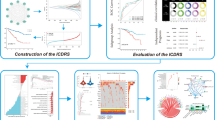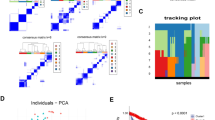Abstract
The aim of this study was to identify novel serological tumor markers for human prostate cancer (PCa). We compared the gene expression profile of PCa tissues to adjacent benign tissues of prostate using gene expression microarray. 1207 genes that were consistently different from adjacent benign tissues of prostate (paired t test, P < 0.05) were selected as differentially expressed genes (DEGs). Among them, 652 DEGs were upregulated in PCa, whereas 555 DEGs were downregulated in PCa. In addition, two-dimensional fluorescence difference gel electrophoresis (2D-DIGE) coupled with MS was performed to screen for candidate markers in the proteome of PCa and adjacent benign tissues of prostate. A total of 89 spots were significantly up-regulated (ratio ≥ 2, P < 0.01) in PCa samples, whereas 66 spots were down-regulated (ratio ≤ −2, P < 0.01). Sixty gene products were identified among these spots. Moreover, 14 potential candidate markers, which were identified as differentially expressed molecules by both gene expression microarray and 2D-DIGE, were chosen for validation and analysis by ELISA. The serum levels of three proteins correlated well with the 2D-DIGE results. Furthermore, the increased serum level of Inosine monophosphate dehydrogenase II (IMPDH2) was significantly associated with the clinicopathological features of the patients with PCa, suggesting its potential as a serological tumor marker. These results demonstrated that integrative transcriptome and proteome analysis could be a powerful tool for marker discovery in PCa. We suggest IMPDH2 as a novel serological tumor marker for detection of early PCa and evaluation of tumor progression.




Similar content being viewed by others
References
Bethesda, MD, http://seer.cancer.gov/csr/1975_2008/, based on November 2010 SEER data submission, posted to the SEER web site, 2011.
Kenfield SA, Stampfer MJ, Chan JM, Giovannucci E. Smoking and prostate cancer survival and recurrence. JAMA. 2011;305:2548–55.
Claverie JM. Computational methods for the identification of differential and coordinated gene expression. Hum Mol Genet. 1999;8:1821–32.
Wachi S, Yoneda K, Wu R. Interactome-transcriptome analysis reveals the high centrality of genes differentially expressed in lung cancer tissues. Bioinformatics. 2005;21:4205–8.
Collet B, Guitton N, Sakali S, et al. Differential analysis of glioblastoma multiforme proteome by a 2D-DIGE approach. Proteome Sci. 2011;9:16.
Klopfleisch R, Klose P, Weise C, et al. Proteome of metastatic canine mammary carcinomas: similarities to and differences from human breast cancer. J Proteome Res. 2010;9:6380–91.
Weeks ME. Urinary proteome profiling using 2D-DIGE and LC-MS/MS. Methods Mol Biol. 2010;658:293–309.
Corona G, De Lorenzo E, Elia C, et al. Differential proteomic analysis of hepatocellular carcinoma. Int J Oncol. 2010;36:93–9.
Muto T, Taniguchi H, Kushima R, et al. Global expression study in colorectal cancer on proteins with alkaline isoelectric point by two-dimensional difference gel electrophoresis. J Proteomics. 2011;74:858–73.
Nishimori T, Tomonaga T, Matsushita K, et al. Proteomic analysis of primary esophageal squamous cell carcinoma reveals downregulation of a cell adhesion protein, periplakin. Proteomics. 2006;6:1011–8.
Sinclair J, Metodieva G, Dafou D, Gayther SA, Timms JF. Profiling signatures of ovarian cancer tumour suppression using 2D-DIGE and 2D-LC-MS/MS with tandem mass tagging. J Proteomics. 2011;74:451–65.
Orenes-Piero E, Cortón M, González-Peramato P, et al. Searching urinary tumor markers for bladder cancer using a two-dimensional differential gel electrophoresis (2D-DIGE) approach. J Proteome Res. 2007;6:4440–8.
Pang J, Liu WP, Liu XP, et al. Profiling protein markers associated with lymph node metastasis in prostate cancer by DIGE-based proteomics analysis. J Proteome Res. 2010;9:216–26.
Rong Y, Jin D, Hou C, et al. Proteomics analysis of serum protein profiling in pancreatic cancer patients by DIGE: up-regulation of mannose-binding lectin 2 and myosin light chain kinase 2. BMC Gastroenterol. 2010;10:68.
Dudoit S. Open source software for the analysis of microarray data. Biotechniques. 2003;Suppl:45–51.
Ihaka R, Gentleman R. R: a language for data analysis and graphics. J Comput Graph Stat. 1996;5:299–314.
Sun W, Xing B, Sun Y, et al. Proteome analysis of hepatocellular carcinoma by two-dimensional difference gel electrophoresis: novel protein markers in hepatocellular carcinoma tissues. Mol Cell Proteomics. 2007;6:1798–1808
Ma Y, Peng J, Huang L, et al. Searching for serum tumor markers for colorectal cancer using a 2-D DIGE approach. Electrophoresis. 2009;30:2591–2599
Stadler SC, Polanetz R, Maier EM, et al. Newborn screening for 3-methylcrotonyl-CoA carboxylase deficiency: population heterogeneity of MCCA and MCCB mutations and impact on risk assessment. Hum Mutat. 2006;27:748–59.
Takemoto K, Miyata S, Takamura H, Katayama T, Tohyama M. Mitochondrial TRAP1 regulates the unfolded protein response in the endoplasmic reticulum. Neurochem Int. 2011;58:880–7.
Liu D, Hu J, Agorreta J, et al. Tumor necrosis factor receptor-associated protein 1(TRAP1) regulates genes involved in cell cycle and metastases. Cancer Lett. 2010;296:194–205.
Leav I, Plescia J, Goel HL, et al. Cytoprotective mitochondrial chaperone TRAP-1 as a novel molecular target in localized and metastatic prostate cancer. Am J Pathol. 2010;176:393–401.
Nguyen MC, Tu GH, Koprivnikar KE, Gonzalez-Edick M, Jooss KU, Harding TC. Antibody responses to galectin-8, TARP and TRAP1 in prostate cancer patients treated with a GM-CSF-secreting cellular immunotherapy. Cancer Immunol Immunother. 2010;59:1313–23.
Barnes BJ, Eakin AE, Izydore RA, Hall IH. Implications of selective type II IMP dehydrogenase (IMPDH) inhibition by the 6-ethoxycarbonyl-3, 3-disubstituted-1, 5-diazabicyclo[3.1.0]hexane-2, 4-diones on tumor cell death. Biochem Pharmacol. 2001;62:91–100.
Guidicelli G, Chaigne-Delalande B, Dilhuydy MS, et al. The necrotic signal induced by mycophenolic acid overcomes apoptosis-resistance in tumor cells. PLoS One. 2009;4:e5493.
Chong CR, Qian DZ, Pan F, et al. Identification of type 1 inosine monophosphate dehydrogenase as an antiangiogenic drug target. J Med Chem. 2006;49:2677–80.
Moosavi MA, Yazdanparast R, Sanati MH, Nejad AS. 3-Hydrogenkwadaphnin targets inosine 5′-monophosphate dehydrogenase and triggers post-G1 arrest apoptosis in human leukemia cell lines. Int J Biochem Cell Biol. 2005;37:2366–79.
He Y, Mou Z, Li W, et al. Identification of IMPDH2 as a tumor-associated antigen in colorectal cancer using immunoproteomics analysis. Int J Colorectal Dis. 2009;24:1271–9.
Fellenberg J, Bernd L, Delling G, Witte D, Zahlten-Hinguranage A. Prognostic significance of drug-regulated genes in high-grade osteosarcoma. Mod Pathol. 2007;20:1085–94.
Fellenberg J, Kunz P, Sfhr H, Depeweg D. Overexpression of inosine 5′-monophosphate dehydrogenase type II mediates chemoresistance to human osteosarcoma cells. PLoS One. 2010;5:e12179.
Collins CD, Purohit S, Podolsky RH, et al. The application of genomic and proteomic technologies in predictive, preventive and personalized medicine. Vascul Pharmacol. 2006;45:258–67.
Chiou SH, Wu CY. Clinical proteomics: current status, challenges, and future perspectives. Kaohsiung J Med Sci. 2011;27:1–14.
Ma Y, Peng J, Huang L, Liu W, Zhang P, Qin H. Searching for serum tumor markers for colorectal cancer using a 2-D DIGE approach. Electrophoresis. 2009;30:2591–9.
Varambally S, Yu J, Laxman B, et al. Integrative genomic and proteomic analysis of prostate cancer reveals signatures of metastatic progression. Cancer Cell. 2005;8:393–406.
Acknowledgments
This work was funded by National Natural Science Foundation of China (30872960, 81170699), Chinese National Key Program of Basic Research (2010CB912700, 2011CB910601), National S&T Major Project (2008ZX10002-016, 2009ZX09301-002), Guangzhou Municipal Science and Technology Key Project (11C23150711), Key Projects of Bureau of Health in Guangzhou Municipality (201102A212015) and Projects of Guangdong Key Laboratory of Urology (2010A060801016).
Conflict of interest
None.
Author information
Authors and Affiliations
Corresponding authors
Additional information
Zhao-dong Han and Yan-qiong Zhang authors contributed equally to this work.
Electronic supplementary material
Below is the link to the electronic supplementary material.
Rights and permissions
About this article
Cite this article
Han, Zd., Zhang, Yq., He, Hc. et al. Identification of novel serological tumor markers for human prostate cancer using integrative transcriptome and proteome analysis. Med Oncol 29, 2877–2888 (2012). https://doi.org/10.1007/s12032-011-0149-9
Received:
Accepted:
Published:
Issue Date:
DOI: https://doi.org/10.1007/s12032-011-0149-9




